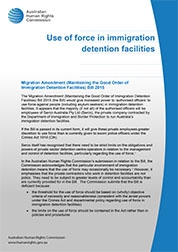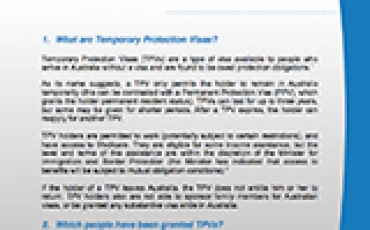Use of force in immigration detention facilities

Migration Amendment (Maintaining the Good Order of Immigration Detention Facilities) Bill 2015
The Migration Amendment (Maintaining the Good Order of Immigration Detention Facilities) Bill 2015 (the Bill) would give increased power to ‘authorised officers’ to use force against people (including asylum seekers) in immigration detention facilities. It appears that the majority (if not all) of the authorised officers will be employees of Serco Australia Pty Ltd (Serco), the private company contracted by the Department of Immigration and Border Protection to run Australia’s immigration detention facilities.
If the Bill is passed in its current form, it will give these private employees greater discretion to use force than is currently given to sworn police officers under the Crimes Act 1914 (Cth).
Serco itself has recognised that there need to be strict limits on the obligations and powers of private sector detention centre operators in relation to the management and control of detention facilities, particularly regarding the use of force.1
In the Australian Human Rights Commission’s submission in relation to the Bill, the Commission acknowledges that the particular environment of immigration detention means that the use of force may occasionally be necessary.2 However, it emphasises that the private contractors who work in detention facilities are not police. They need to be subject to greater levels of control and accountability than are currently provided for in the Bill. The Commission submits that the Bill is deficient because:
- the threshold for the use of force should be based on (wholly) objective criteria of necessity and reasonableness (consistent with the arrest powers under the Crimes Act and departmental policy regarding use of force in immigration detention facilities)
- the limits on the use of force should be contained in the Act rather than in policies and procedures
- specific limits should be included when force is proposed to be used to move detainees within an immigration detention facility, and when force is proposed to be used against children
- if private contractors use excessive force, both the contractors and the Commonwealth should be legally accountable.
These principles inform the Commission’s recommendations for amendments to the Bill (included as an Appendix to this factsheet).
Concerns about use of force in detention facilities
The Commission’s concerns about granting private employees working in detention facilities greater authority to use force are based on its experience of investigating human rights complaints made by people in immigration detention.
People in immigration detention have the right to be treated with humanity and respect for the inherent dignity of the human person, and the right not to be subjected to torture or cruel, inhuman or degrading treatment or punishment.3
In the past the Commission has found that officers employed by private detention service providers (detention officers) have breached the human rights of immigration detainees (including children) by using unnecessary force against them. For example:
- A detainee was grabbed by the throat by a detention officer at Villawood Immigration Detention Centre, and had his head forced back against a wall. The officer then used force to subject the detainee to an unauthorised strip search.4
- A seven year old boy detained at Woomera Immigration Reception and Processing Centre was struck across the legs with a baton by a detention officer. This occurred during a riot at the centre and while the boy was being carried by his mother.5
- A twelve year old boy detained at Woomera Immigration Reception and Processing Centre sustained a slight lump to the right side of his head and complained of pain to his face and wrists after being forcibly transferred by detention officers from Woomera Immigration Detention Centre to Baxter Immigration Detention Centre.6
Most recently, the Commission has been concerned by the use of unnecessary force when moving children between immigration detention facilities. The Commission expects that in the vast majority of cases it will not be necessary to use force in order to move a detainee within an immigration detention facility.
In 2014 a number of unaccompanied children on Christmas Island raised concerns with the Commission that Serco officers had used force against them when moving them between different compounds on 24 March 2014. The incident is described in the Commission’s report The Forgotten Children: National Inquiry into Children in Immigration Detention 2014.7
The Commission found that the decision to seek approval for the use of force was made quickly and that alternatives to the use of force were not adequately considered. The organisation providing care and welfare services to the unaccompanied children was not consulted prior to authorisation for the use of force being sought. A range of de-escalation techniques such as discussion, negotiation or verbal persuasion could have been used more effectively. No interpreter was used during the brief period of negotiation with the children. The Commission accordingly found that the decision to approve the use of force to transfer the unaccompanied children breached their right to be treated with humanity and respect, contrary to the Convention on the Rights of the Child.8
Appendix – Commission’s recommendations for amendments to the Migration Amendment (Maintaining the Good Order of Immigration Detention Facilities) Bill 2015
Recommendation 1
The Commission recommends that the opening words of s 197BA(1) be amended to read:
An authorised officer may use such force against any person or thing as is necessary and reasonable to: …
Recommendation 2
The Commission recommends that the opening words of s 197BA(5) be amended to read:
In exercising the power under subsection (1), an authorised officer must not:
(a) subject a person to greater indignity than is necessary and reasonable in the circumstances; …
Recommendation 3
The Commission recommends that the Committee seek clarification from the Government as to whether it intends to authorise employees of contracted detention service providers to use lethal force and, if so, what controls and limits will be put in place to ensure that the right to life is adequately protected.
Recommendation 4
The Commission recommends that a new subsection be added after s 197BA(5) in the following form:
In exercising the power under subsection (1), an authorised officer must:
(a) use force or restraint only as a measure of last resort in light of available alternatives including negotiation and de-escalation;
(b) use force only for the shortest amount of time necessary;
(c) not use force in a way that amounts to cruel, inhuman or degrading treatment;
(d) not use force in a way that amounts to punishment;
(e) not use excessive force.
Excessive force is force beyond that which is reasonably necessary in the circumstances of any particular incident including:
- any force when none is needed
- more force than is needed
- any force or level of force continuing after the necessity for it has ended
- knowingly wrongful use of force.
Recommendation 5
The Commission recommends that a new subsection be added after s 197BA(2) which clarifies that if an officer intends to use force in order to move a detainee within an immigration detention facility, this must be preceded by a request to the detainee to move (with the assistance of an interpreter if required), a reasonable opportunity being given to the detainee to move voluntarily, and all reasonable alternatives to the use of force being exhausted prior to force being used to move a detainee.
Recommendation 6
The Commission recommends that new provisions be added after s 197BA(5) dealing with the limitations on the use of force in relation to children. The amendments in this recommendation assume that the amendments in recommendation 4 (dealing with limitations more generally) have been accepted. The new provisions should provide that an authorised officer must not exercise the power under subsection (1) to use force in relation to a minor unless:
- all alternatives to the use of force including negotiation and de-escalation techniques have been attempted and have failed;
- where possible, the proposed use of force has been raised with the minor’s parent or guardian and the parent or guardian has been given sufficient opportunity to both speak with the minor and to make submissions to the authorised officer about the use of force;
- authorisation for the particular use of force has been sought and obtained from the director of the facility;
- where it is not possible to discuss the proposed use of force with the minor’s parent or guardian in advance, force is only used where there is an unacceptable risk of escape or immediate harm to the child or others.
Recommendation 7
The Commission recommends that:
(a) Section 197BF(1) be amended to read:
No proceedings may be instituted or continued in any court against an authorised officer in relation to an exercise of power under section 197BA if the power was exercised in good faith and the use of force did not exceed what was authorised by that section.
(b) Section 197BF(4) be deleted.
Recommendation 8
The Commission recommends that a new subsection be added after s 197BB(4) in the following form:
The Secretary must notify the Ombudsman in writing of the receipt of the complaint.
Recommendation 9
The Commission recommends that the Commonwealth Ombudsman be given the power and necessary resources to review the administration of the Secretary’s investigation of complaints under s 197BC as required and to report to Parliament on an annual basis about the comprehensiveness and adequacy of the processes used by the Secretary.
[1] Serco, Submission by Serco Australia to the Joint Select Committee on Australia’s Immigration Detention Centre Network (August 2011), p 37. At http://www.aph.gov.au/DocumentStore.ashx?id=a7f17e25-d2e4-41e4-8b97-9d4de18ce98c (viewed 3 August 2015).
[2] See Australian Human Rights Commission, Submission to the Senate Legal and Constitutional Affairs Legislation Committee Inquiry into the Migration Amendment (Maintaining the Good Order of Immigration Detention Facilities) Bill 2015 (Cth) (April 2015). At https://www.humanrights.gov.au/submissions/migration-amendment-maintaining-good-order-immigration-detention-facilities-bill-2015 (viewed 3 August 2015).
[3] International Covenant on Civil and Political Rights, 1966, arts 10 and 7 (respectively). At http://www.austlii.edu.au/au/other/dfat/treaties/1980/23.html (viewed 3 August 2015); Convention on the Rights of the Child, 1989, art 37(a) and (c). At http://www.austlii.edu.au/au/other/dfat/treaties/1991/4.html (viewed 3 August 2015).
[4] Australian Human Rights Commission, Report of an inquiry into a complaint by Mr AV of a breach of his human rights while in immigration detention [2006] AusHRC 35. At http://www.humanrights.gov.au/publications/hreoc-report-no-35 (viewed 3 August 2015).
[5] Australian Human Rights Commission, Report of an inquiry into a complaint by Ms KJ concerning events at Woomera Immigration Reception and Processing Centre between 29-30 March 2002 [2004] AusHRC 27. At http://www.humanrights.gov.au/publications/hreoc-report-no-27 (viewed 3 August 2015).
[6] Australian Human Rights Commission, Yousefi family v Commonwealth [2011] AusHRC 46. At http://www.humanrights.gov.au/publications/aushrc-46-yousefi-family-v-commonwealth-australia (viewed 3 August 2015).
[7] Australian Human Rights Commission, The Forgotten Children, National Inquiry into Children in Immigration Detention (2014), pp 160-165. At http://www.humanrights.gov.au/our-work/asylum-seekers-and-refugees/publications/forgotten-children-national-inquiry-children (viewed 3 August 2015).
[8] Convention on the Rights of the Child, 1989, art 37(c). At http://www.austlii.edu.au/au/other/dfat/treaties/1991/4.html (viewed 3 August 2015).


